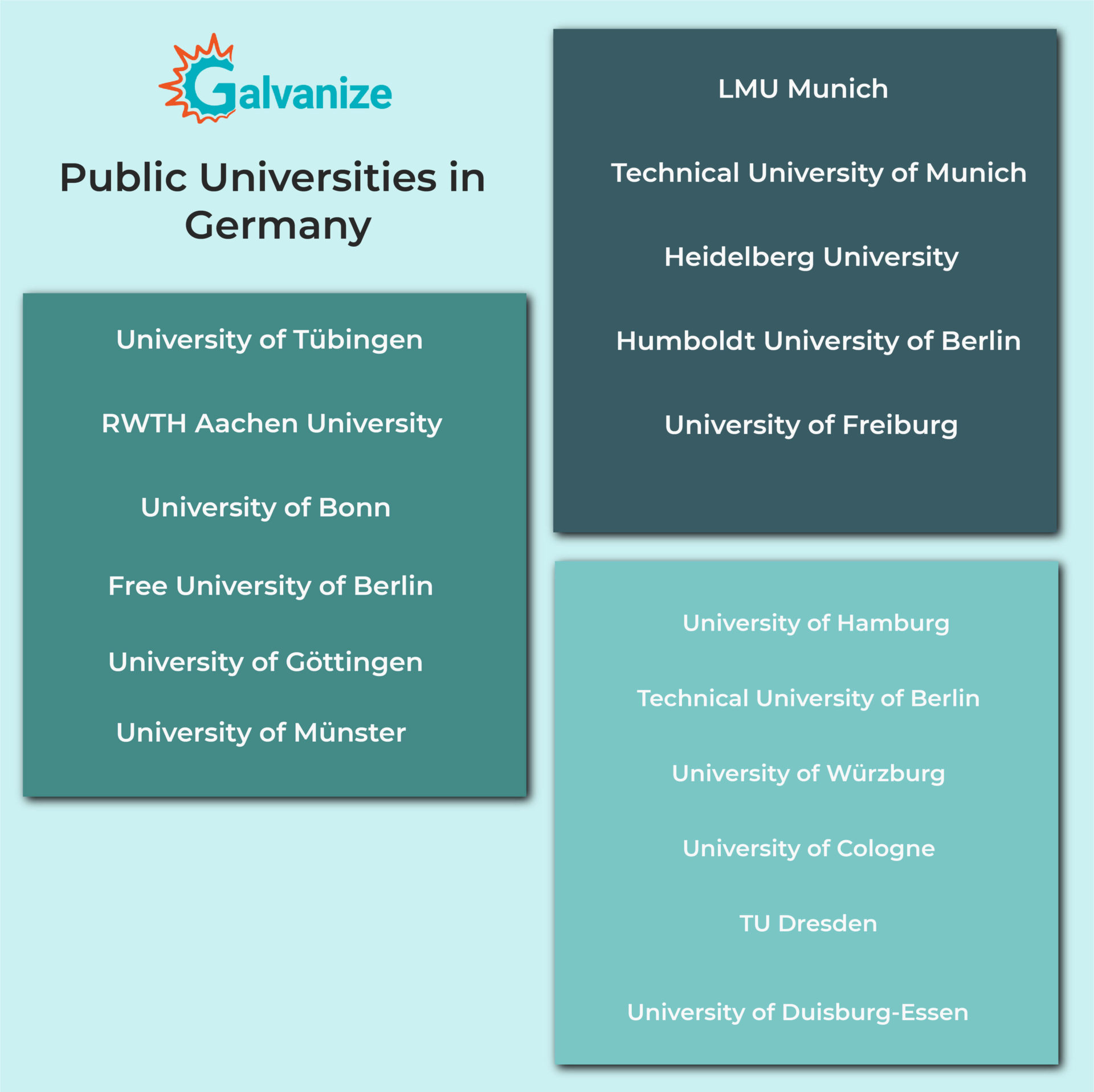
Chapter 1
Overview
Germany is a paradise for higher education. Unlike any other nation, Germany has many internationally renowned institutions, numerous courses to select from, globally regarded degrees that guarantee excellent employability and low living costs. Germany also boasts a deep and rich heritage and a vibrant and dynamic lifestyle that blends the modern with the vintage and will fascinate and make you cherish every minute spent here. Now, let us jump into the main question. Is college in Germany free? Read on to learn about free education in Germany.
Why Study in Germany?
Low or No Tuition Fees:
Germany is the only top study destination where universities do not charge tuition costs when university education has become a need owing to an increased demand for highly skilled workers. As a result, the cost of going to university is rising quicker.
All international students getting into a public college in Germany would be exempt from paying regular tuition fees, according to a decision made in October 2014. International students will only be responsible for a few administrative charges such as student contribution, student union fee, and a public transportation ticket, which total roughly €250 each semester.
Top-Ranked Universities:
According to official records from 2018, Germany has 429 public higher education institutions, 106 of which are colleges.
Students respect these colleges for their educational quality, hands-on experiences throughout their studies, opportunity to progress intellectually during and after graduation, and, most significantly, the safe and welcoming environment.
They have a global reputation for teaching and research quality based on a long and illustrious history of higher education. Every year, several new German universities are added to the world rankings along with the traditional top-ranked universities. Of course, a few German universities are among the greatest and the oldest in Europe.
Travel Europe on a student visa:
Suppose you are a European student who wishes to live and study in Germany. In that case, you will have the same privileges as a German citizen or a EUEFTA citizen in terms of free entrance and the ability to study and work without the need for any extra licences.
If you are an international student and wish to study in Germany, you must first get a German study visa. Then, unless you are engaged in a summer language programme, you must apply for a student visa that enables you to stay in Germany for over 90 days, as well as a residence permit that lets you live and travel across the country.
Countless Degree Courses:
In addition to having many institutions, Germany provides a diverse range of degree courses to satisfy a wide range of interests. As an industrialized country, Germany has spent a lot on Engineering colleges. Today, Engineering majors are highly appreciated at German universities. However, these universities provide a wide range of degree courses, some world-renowned, such as medicine and pharmacy.
Furthermore, conventional courses in German universities are rapidly increasing as new study disciplines emerge in response to cutting-edge scientific advancement. So whether you want to study atoms or fascinating galaxies in the cosmos, Germany is certain to have a programme that will teach you about it from the best experts in the subject.
Globally Recognized Study Programs:
In terms of organization and delivery to students, study programmes at German universities are cutting-edge. They are made to keep up with the most recent scientific advancements worldwide and prepare people to handle global issues with confidence.
Their curriculum is constantly provided and changed to uncover or construct complete teaching and research methodologies. You will be awarded a globally recognized and valuable degree after your study.
Employers all around the globe hold you in high regard because they are aware of the excellent level of education you received throughout your studies, which qualifies them to recruit you and entrust you with significant duties.
Affordable Costs of Living
The living cost in Germany for international students is relatively cheap with some careful money management and minor changes to your former lifestyle. Ordinarily, pricing in metropolitan locations would be greater than in rural areas.
Rent is the most significant financial worry you will face while studying in Germany. However, you have numerous possibilities, and while the cost of rent varies, it is not too costly.
To reduce your financial load, find somebody with whom you can share a room, which will lower your costs in half.
Work Opportunities For International Students
According to estimates, more than 60% of current international students are working part-time while studying in Germany.
You do not need a degree because there are so many different occupations to choose from that you will most likely find anything.
While you may not require additional funds to cover living expenses or your programme does not have a placement year, working part-time. At the same time, studying is an option you should strongly consider in Germany. Professional experience may help you become more employable in the future, educate you on how to be more disciplined in your lifestyle, and teach you how to live independently.
Future Prospects
Your German university certification is an immensely valued and respected qualification worldwide. Therefore, graduates from German universities have a high employability rate in the worldwide job market.
As a result, once you have your degree, a slew of firms will approach you with enticing offers to recruit you. They have faith in your professional credentials, which you earned via a top-notch education in Germany. They are certain that you can help them grow their firm. Irrespective of your academic subject or the location in which you wish to work, your German degree will assist you in obtaining a high-paying and ideal position.
Diverse Community
Today, many foreigners who come to work and reside with their families coexist peacefully with German citizens.
Moreover, German universities invite thousands of international students who see Germany achieve its educational objectives. However, you will experience a varied society in Germany, each with its unique characteristics that will cause you to see the world in a new light.
You may also meet many new people from all over the world and learn about their cultures and traditions.
Is Studying in Germany Free?
In Germany, a college education is free. However, because the subject has been over-discussed, many individuals are unsure if this is true or not.
The government decided in 2014 to eliminate international fees at all public universities. Although foreign tuition fees have been reinstated in several German regions, the cost of education in Germany remains far lower than elsewhere.
However, in most universities, all you have to pay is a small fee to cover institutional and public transportation expenses. The payment is a “semester contribution” and is made at the end of each semester. Its price varies per university, but it typically ranges between €150 and €250 every semester.
Private colleges, however, charge foreign fees. As a result, there is a wide range of international fees at these schools that vary depending on your nationality and the sort of course you choose.
Why Choose Galvanize Admission Counseling?
Chapter 2
List of Public Universities in Germany :
|
University |
World Rank 2021 |
|
LMU Munich |
32 |
|
Technical University of Munich |
41 |
|
Heidelberg University |
42 |
|
Humboldt University of Berlin |
80 |
|
University of Freiburg |
83 |
|
University of Tübingen |
78 |
|
RWTH Aachen University |
107 |
|
University of Bonn |
114 |
|
Free University of Berlin |
118 |
|
University of Göttingen |
130 |
|
University of Hamburg |
135 |
|
Technical University of Berlin |
140 |
|
University of Würzburg |
140 |
|
University of Cologne |
145 |
|
TU Dresden |
152 |
|
University of Münster |
195 |
|
University of Duisburg-Essen |
201-250 |
#1. Ludwig Maximilian University
It is Germany’s second-highest-ranking university, having been founded in 1472. It is one of the top 100 universities globally, with up to 40 Nobel laureates among the alumni, namely Otto Hahn, Max Planck, and Wilhelm Rontgen. This free institution is also one of the biggest in the world of student enrollment, with over 50,000 students now enrolled.
Popular courses:
- Architecture
- Chemistry
- Computer Science
- Construction Geo Environment
- Aviation, Space Travel and Geodesy
- Mechanical Engineering
- Electrical and Computer Engineering
- Mathematics
- Physics
- Sports and Health Sciences
- Economics
- Medicine
FAQs
Is IELTS accepted at Ludwig Maximilian University?
Yes
What is the yearly Hostel & Meals Expense at Ludwig Maximilian University?
3600 Euro
#2. Technical University of Munich
The Technical University of Munich is Germany’s highest-ranked university, with a global ranking of 53rd. Every year, it welcomes up to 5000 international students. For a long time, the institution has set high educational standards in Germany. It has been named the greatest university several times. This university is also a part of the TU9, Germany’s most prestigious and well-known institution. The university has a track record of generating top-tier leaders in many professions, with 15 Nobel Laureates among its alumni.
Popular courses:
- Catholic Theology
- Protestant Theology
- Law
- Business Administration
- Economics
- Medicine
- Veterinary Medicine
- History and the Arts
- Psychology and Educational Sciences
- Mathematics, Informatics and Statistics
- Study of Culture
- Languages and Literature
- Social Sciences
- Physics
- Biology
- Chemistry and Pharmacy
- Geosciences
FAQs
What is the Technical University of Munich known for?
It is ranked #1 in the fields of engineering and computer science
What GPA do I need to take admission in TUM?
You will require a minimum cumulative GPA of 4.5
#3. University of Heidelberg
The institution was founded in 1386 and is Germany’s oldest university, with 30,898 students, including over 6000 international students. With its sensible approach to studies and inviting professors, Heidelberg University has achieved its excellent standards in liberal arts subjects. As a result, it is currently ranked among its top 60 institutions.
Popular courses:
- Biosciences
- Chemistry and Earth Science
- Mathematics and Computer Science
- Physics and Astronomy
- Behavioural and Cultural Studies
- Economics and Social Sciences
- Law
- Modern Languages
- Philosophy
- Physics and Astronomy
- Theology
- Medicine
FAQs
Is it hard to get into the University of Heidelberg?
The acceptance rate is 76% which is pretty good.
Can I study medicine at the University of Heidelberg?
Yes
#4. Humboldt University Berlin
The institution was founded in 1811 by Frederick William III of Prussia on Wilhelm von Humboldt’s proposal. The University’s pioneering efforts, influence, and competence in higher education have earned it the “mother of all modern institutions.” The university has a record of 33,033 enrolments and 41 Nobel Prize winners.
Popular courses:
- Law
- Culture, Social Sciences and Education
- Life Sciences
- Mathematics and Natural Sciences
- Philosophy
- Linguistics and Literature
- Theology
- Business and Economics
- Medicine (with a joint institution)
FAQs
What is the acceptance rate of Humboldt University Berlin?
75.1%
Is Humboldt University Berlin a good university?
Yes, it is ranked #78 in Best Global Universities
#5. Karlsruhe Institute of Technology:
It is one of Germany’s largest educational and research institutes. The Karlsruhe Institute of Technology, usually known as KIT, is a prestigious university noted for its technology and natural science departments. Furthermore, the university is well-known and ranked 26th in the world in computer engineering. At KIT, there are up to 25,000 students enrolled in 11 different faculties.
Popular courses:
- Architecture
- Civil Engineering
- Chemistry and Biosciences
- Chemical and Process Engineering
- Humanities and Social Sciences
- Electrical Engineering and Information Technology
- Mechanical Engineering
- Economics and Management
- Physics
- Informatics
- Mathematics
FAQs
How many campuses are there at Karlsruhe Institute of Technology?
2
When was Karlsruhe Institute of Technology established?
2009
#6. Technical University of Berlin:
The Technical University of Berlin is another prestigious European university with highly regarded engineering programmes. It was formed in 1879 and is also known as TU Berlin. It boasts the greatest proportion of international students in Germany, with 6885 enrolling out of 34,428.
Popular courses:
- Biology, Chemistry, and Pharmacy
- Earth Sciences
- Education and Psychology
- History and Cultural Studies
- Law
- Mathematics and Computer Science
- Philosophy and Humanities
- Physics
- Political and Social Sciences
- Veterinary Medicine
- Business and Economics
- Medicine (with a joint institution)
FAQs
How many international students are at the Technical University of Berlin?
8443
#7. Free University of Berlin:
The Free University of Berlin is one of Germany’s most prestigious universities, renowned for its research in life sciences, natural sciences, and humanities. There are up to 6300 international students enrolled out of 31,500 students.
Popular courses:
- Mathematics, Computer Science and Natural Sciences
- Architecture
- Civil Engineering
- Mechanical Engineering
- Georesources and Materials Engineering
- Electrical Engineering and Information Technology
- Arts and Humanities
- School of Business and Economics
- Medicine
FAQs
Is the tuition fee-free of cost in the Free University of Berlin?
Yes, except for some courses.
Which English proficiency tests are accepted in the Free University of Berlin?
IELTS, TOEFL
#8. RWTH Aachen University:
It is a German research institution based in Aachen. With nearly 40,000 students, RWTH University is one of the most important technological universities in the country. About 140 courses and study programmes are available at the university. It is primarily a technological university, although it also provides courses in the arts, medicine, commerce, humanities, and other subjects. The university removed tuition fees in 2011; hence academic costs are virtually non-existent when studying at this prestigious institution.
Popular courses:
- Humanities and Education
- Mathematics and Natural Sciences
- Process Sciences
- Electrical Engineering and Computer Science
- Traffic and Machine Systems
- Planning Building Environment
- Economics and Management
FAQs
How many international students are there in the RWTH Aachen University?
10455
What is the rank of RWTH Aachen University in Europe?
#41
#9. Reutlingen University:
It is located in Reutlingen, Baden-Württemberg, Germany’s southernmost province. Reutlingen University is among the top universities globally for international and business education. Around 5,400 students attend classes at the site, divided into five faculties: ESB Business School, Applied Chemistry, Technology, Computer Science, and Textile & Design.
Popular courses:
- MBA International Management
- Master of Science in Mechanical Engineering
- MSc International Business Development
- MSc International Management
- BSc International Business
FAQs
What is the Yearly Hostel & Meals Expense at Reutlingen University?
1930 Euro
Which English tests are accepted at Reutlingen University?
IELTS, TOEFL
#10. Leipzig University:
The University of Leipzig is one of Germany’s top universities in terms of research and clinical expertise. There are 14 faculties, approximately 130 institutes and centres, and 17 core institutions at the university. The University of Leipzig provides 155 undergraduate and graduate programs in law, sciences, arts, communications, foreign languages, and other fields. At various historical levels, Leipzig has reached several significant milestones.
Popular courses:
- Master of Science in Business Administration
- MSc in Bioinformatics
- BSc in Computer Science
- MBA in Insurance Management
- MSc in Advanced Spectroscopy in Chemistry
FAQs
When was Leipzig University established?
1409
Is IELTS accepted in Leipzig University?
Yes
Secure that dream admit
Right from LOR, University Shortlisting, SOP, Application Reviews till Visa Counselling. Galvanize has your back.
Find out how#11. University of Bayreuth
For students and staff, the institution provides various undergraduate, postgraduate, doctoral, and management programs. In addition, the University of Bayreuth has advanced research centres where extensive studies can be conducted. These centres collaborate with all other centres and faculties to provide an integrative research approach.
Popular course:
- Bachelor of Science in Computer Science
- M.Sc. in Food Quality and Safety
- MBA in Health Care Management
- M.Sc. in Business Administration
- Masters In Applied Sciences
FAQs
What is the total number of international students at the University of Bayreuth?
1352
Is IELTS accepted at the University of Bayreuth?
Yes
#12. Braunschweig University of Technology
This university is a member of TU9, a society that unites Germany’s most prestigious technical universities. Braunschweig University has its research airport. It is considered one of Germany’s best engineering schools. The main focus is research. Metrology, Future City, Infections and Therapeutics, and Mobility are the four main areas it conducts research.
Popular courses:
- PhD in Mechanical Engineering
- M.Sc in Data Science
- MSc Architecture
- B.Sc in Architecture
- MSc Civil Engineering
FAQs
When was the Braunschweig University of Technology established?
1745
How many international students study at the Braunschweig University of Technology?
2771
#13. University of Munster
The institution provides accommodation for students on its campus. It has dining spaces and a housing facility for students’ families who wish to visit the campus. There are also guesthouses available for overseas researchers. The campus has a reputation for being well-kept and structured. The campus is surrounded by greenery. The university library includes up to 6.2 million volumes, research papers, and journals. Furthermore, the campus organizes various activities, festivals, and competitions that aid in the development of the students’ personalities.
Popular courses:
- Bachelors in Medicine
- Master of Science in Information Systems
- BS in Psychology
- Bachelors in Biology
FAQs
Is IELTS accepted at the University of Munster?
Yes
How many international students are there at the University of Munster?
3164
#14. University of Cologne
The University of Cologne is a well-known German university. It was the sixth university founded in Central Europe, yet it was closed in 1798 until being reopened in 1919. As a result, it is now widely regarded as one of Germany’s finest institutions. Moreover, it is today regarded as one of Germany’s largest universities, with about 50,000 students.
Popular courses:
- Master of Business Administration (MBA)
- M.Sc. in Business Administration
- Master of Science in Information Systems
- Master of Science in Psychology
FAQs
When was the University of Cologne established?
1919
Is IELTS accepted at the University of Cologne?
Yes
#15. University of Bonn:
This university is well-known among Germany’s top higher education institutions and the world’s research-intensive universities. Following World War II, this university quickly reopened its doors. It remained committed to establishing a positive reputation on a global scale. This institution developed a global orientation due to the construction of new facilities on campus and the expansion of its fields of expertise.
Popular courses:
MSc in Microbiology
MSc in Food Technology
Masters in Computer Science
Bachelors in Computer Science
MSc in Astrophysics
FAQs
Is the University of Bonn free for international students?
The tuition fee is free of cost.
What is the World University Ranking of the University of Bonn?
#240
Public Universities Ranking :
|
University |
World Rank 2021 |
|
LMU Munich |
32 |
|
Technical University of Munich |
41 |
|
Heidelberg University |
42 |
|
Humboldt University of Berlin |
80 |
|
University of Freiburg |
83 |
|
University of Tübingen |
78 |
|
RWTH Aachen University |
107 |
|
University of Bonn |
114 |
|
Free University of Berlin |
118 |
|
University of Göttingen |
130 |
|
University of Hamburg |
135 |
|
Technical University of Berlin |
140 |
|
University of Würzburg |
140 |
|
University of Cologne |
145 |
|
TU Dresden |
152 |
|
University of Münster |
195 |
|
University of Duisburg-Essen |
201-250 |
Advantages of living in Canada: As we mentioned earlier, it is worth checking out this piece about reasons to live in the Great North.
Eligibility Requirements
German universities have highly strict admissions standards. Admission to UG degrees is predicted to be as high as 90%.
In addition, to be eligible to enroll for a UG program in Germany, students must either complete one year of Bachelor’s study in India or take the IIT JEE or Fa test. In addition, students must take the IELTS or TOEFL to demonstrate their proficiency in the language.
For PG courses, students must have a minimum of 70 to 75 percent from a reputable Indian university. They must also take the GRE, with a score of at least 300 being sufficient. It can also help a student’s profile if they enroll in the course, notwithstanding the University’s request. A score of 6.0 on the IELTS or 100 on the TOEFL is also necessary.
International study programmes, taught in English, are designed for international students. Therefore, there is no use in enrolling in German-taught courses unless the student has a strong command of the language. Some programs also provide the option of writing a dissertation in German. However, students must first demonstrate their proficiency in the language.
How to Apply in German Public Universities?
You can directly apply to the institution’s international office for most courses. However, you can visit the German Academic Exchange Service’s (DAAD) website, www.uni-assist.de, a centralized admissions platform for international students, however not all universities use it. Therefore, to maximize your chances of acceptance, you may want to apply to many courses and colleges independently.
Many German institutions offer admission twice a year, allowing students to begin their studies in the winter or summer. Winter enrollment applications must be submitted by 15 July, and summer enrollment applications must be submitted by 15 January. Nevertheless, application deadlines change per institution. In addition, the same university may have various deadlines for different programmes, so be sure to double-check the precise dates for your desired course.
It is recommended that applications be submitted at least 6 weeks before the deadline to allow any necessary adjustments or additions. After the date has passed, you should expect to be given an official acceptance or rejection within 1 to 2 months.
Each university will choose the specific documentation needed and the application procedure, but you will normally be asked to submit:
- A certified copy of your high-school diploma or previous degrees and any other relevant qualifications in the original language
- A translated overview of your course modules and grades
- A passport photo
- A copy of your passport
- Proof of language proficiency
Scholarships To Study College In Germany
The cherry on top of attending college in Germany is that, despite its low cost, there are numerous scholarships available.
Governmental and non-governmental entities, as well as particular universities and foundation programmes, can offer these scholarships. These awards are awarded based on various factors that vary depending on your unique circumstances. However, you will likely be eligible for at least one of them in terms of the number.
If you are an international student, you can avail of these scholarships:
1. DAAD WISE Scholarship Program
This program is open to students studying Bachelor, Integrated, or Dual studies at certain Indian colleges. They can be used in various fields, including mathematics, engineering, and natural sciences. DAAD scholarships offer students the most common internship programs, with a wide range of general and unique courses.
AFTER BEING SELECTED, a DAAD WISE candidate will get €750 per month in living costs, €1,075 in travel allowance, and medical insurance.
2. Konrad-Adenauer-Stiftung Scholarship
International students and doctoral candidates are the focus of this fellowship initiative. It accepts applications from students who have finished their Bachelor’s or Master’s degrees in their home country and seek further education. The program requires applicants to have an above-average academic record and a strong interest in political issues.
Candidates from underdeveloped countries are given priority. The study goal determines the scholarship amount. It might be either a € 500 tuition reimbursement or a € 1,100 monthly allowance for three years.
3. Heinrich Boll Scholarships
This program is for students who have passed the university admission exam with flying colours. International students can enrol in any university’s master’s or doctoral programs and study in Germany.
For Masters Courses, the scholarship sum is €850 a month, with additional individual allowances. In some situations, it also pays the tuition expense. The monthly stipend for PhD studies is €1000, with a monthly travel allowance of €100. The sum is given to students for a set length of time.
4. Kofi Annan MBA Scholarships
Emerging leaders from developing nations are eligible for the Kofi Annan scholarship. It provides a two-year Masters in Management (MIM) program or a one-year full-time MBA program. A student must have a Bachelor’s degree and an excellent academic record to apply. Other prerequisites include competence in English and a passion for contributing to developing his or her nation.
Eligible candidates receive complete tuition for the courses, which amounts to €25,000 for MIM participants and €43,500 for MBA students. In addition, the program supports visas, travel, housing, marketing, and insurance.
5. ESMT Women's Academic Scholarship
This scholarship is available to female students applying to the European School of Management and Technology (EST) for a full-time MBA program. The scholarship is € 15,000. The admissions deadlines determine the program’s deadline. Therefore, before applying, candidates should thoroughly review the official website.
6. Goethe Goes Global Scholarships:
The Goethe Goes Global Scholarship is a unique Master’s degree program. The program’s main goal is to help students improve and support their academic careers. Selected individuals will be able to study at the Goethe University in Germany due to this scholarship.
Every year, approximately 20 scholarships are given to international students. In addition, students can receive €1,000 a month as a scholarship from the university till the end of their Master’s program.
7. EMS Undergraduate Scholarship:
The European Management School (EMS) offers this scholarship to overseas students who intend to pursue a Bachelor’s degree. The program’s goal is to make it easier for undergraduates to begin their professional careers. The program offers a 50% tuition discount and global exposure that will help the scholar develop his or her personality.
8. WHU-Otto Beisheim School of Management, International Scholarships
International students interested in pursuing an MBA are encouraged to apply for their scholarship program. It is open to talented and worthy candidates with a suitable Bachelor’s degree. Only one application is accepted per person, and confirmation of English proficiency is required. The program has a value of up to €10,000 but is not limited to that amount.
9. Master Scholarships at University of Stuttgart
At the University of Stuttgart, Master’s scholarships are fully sponsored. It is for students from developing nations who want to study in Germany for a longer period. Integrated Urbanism, Infrastructure Planning, and Sustainable Design are all topics covered in the program.
This program is open to those who have an interest in these disciplines. However, it is also necessary for the student to have a strong academic record.
10. DLD Executive MBA Scholarship
The Berlin School of Creative Leadership offers the DLD scholarship in conjunction with the digital innovation conference. Eligible candidates will pursue an MBA in Creative Leadership through this program.
The program is designed for experienced senior executives in digital, media, marketing, technology, and music. One winner gets €23,000 in tuition support, while the other 3 runner ups will get €10,000.
Living Cost in Germany
The costs of studying abroad, which include tuition fees, monthly or yearly charges, and everyday costs, are a significant consideration. In addition, because Germany is one of the EU’s larger members, it is a top location for higher education. As a result, living costs are higher.
Compared to a few European Union states, Germany may appear to be a low-cost study location. However, Germany’s average cost of living is greater than the European Union’s average. As a result, before enrolling in higher education in Germany, you must have a solid financial foundation.
Prices and typical living costs vary based on the region of the university and city you choose to reside in, just as they do in any other country. Nevertheless, it is general knowledge that the most expensive component of living in Germany is renting an apartment.
According to sources and data, international students living in Germany may have to pay between €800 and €1,000 per month. The average monthly expenditure for students is roughly €861, or €10,332 per year.
Expenses Table:
|
Expense |
Rate in INR |
|
Rent |
25000 - 60000 |
|
Food |
12000 - 21000 |
|
Travelling |
~ 12000 |
|
Health Insurance |
8000 - 10000 |
|
Utilities |
12000 - 25000 |
|
Personal Expenses |
4300 - 17000 |
|
Total Expenses |
64000 - 14700 |
Top 10 Germany Cities for International Students
|
No. |
City |
Average Monthly Rent |
|
1. |
Munich |
1,200 EUR (INR 1 Lakh) |
|
2. |
Frankfurt |
870 EUR (INR 76,000) |
|
3. |
Stuttgart |
850 EUR (INR 74,000) |
|
4. |
Hamburg |
840 EUR (INR 73,000) |
|
5. |
Berlin |
800 EUR (INR 70,000) |
|
6. |
Cologne |
730 EUR (INR 64,000) |
|
7. |
Dusseldorf |
675 EUR (INR 59,000) |
|
8. |
Leipzig |
500 EUR (INR 43,500) |
|
9. |
Dortmund |
460 EUR (INR 40,000) |
|
10. |
Essen |
450 EUR (INR 39,000) |
High Paying Jobs in Germany
|
Job Role |
Salary (Euro/year) |
|
Financial Analyst |
56,300 |
|
Financial Manager |
88,6000 |
|
Aerospace Engineer |
54,500 |
|
Architect |
53,600 |
|
Business Development Manager |
70,600 |
|
Civil Engineer |
40,000 |
|
CEO |
96,000 |
|
IT Manager |
76,100 |
|
Mechanical Engineering Manager |
54,100 |
|
Automotive Assembly Manager |
51,200 |
|
Automotive General Manager |
81,900 |
|
Automotive Project Manager |
55,800 |
|
Automotive Purchase Manager |
62,700 |
|
Automotive Branch Manager |
67,300 |
Top Recruiting Companies in Germany
|
Company |
Salaries (Euro/year) |
|
BMW |
83,000 |
|
Bain & Co |
132,000 |
|
PwC |
79,000 |
|
Bosch |
70,000 |
|
Delivery Hero |
58,000 |
|
Volkswagen |
55,000 |
|
Allianz |
75,000 |
|
Deloitte |
75,000 |
|
Zalando SE |
64,000 |
|
HSBC |
155,000 |
|
Morgan & Stanley |
263,000 |
|
Siemens |
81,000 |
|
Deutsche Telekom |
97,000 |
Why is it important to learn German to get jobs in Germany?

Here are some reasons why it is important to learn Germany to find jobs:
Eligible for more job opportunities
Effective communication is critical in many occupations. For example, assume you are a business analyst who has trouble understanding the client’s requirements. Alternatively, you are in charge of a team but cannot seem to get them to comprehend what you expect of them. There are a limited number of positions that do not require candidates to speak German. However, as your language abilities develop, you will be evaluated for more employment positions.
Common working language:
While Germans have a good level of English proficiency on average, the working language of most organizations is still German. This implies that all meetings, reports, and official correspondence shall be conducted in German. Even if English is acknowledged as a working language at MNCs, do not count on your coworkers to speak English.
Everything will be German.
As soon as you arrive in Germany, you will be immersed in a foreign language. Everything will be in German, whether you are food shopping, navigating new areas, or dealing with authorities. It is easy to become disoriented if you do not know German. Apart from that, all official documents such as rental agreements, financial records, and tax filings are written in German!
Conclusion:
Before you decide to study in Germany, you should know the living expenses and associated study fees. The best part is that the living cost in Germany is very affordable for students, particularly given the high quality of education available. Furthermore, student living costs in Germany are far lower than in France, the United Kingdom, or Italy. Bachelor’s degree programs at public universities in Germany are free of charge. This is because the government substantially subsidized higher education. Degree programs are offered in both German and, in some instances, English.














